- Home
- Robert J. Mrazek
Valhalla Page 3
Valhalla Read online
Page 3
“Fine,” he said. “Why not go out and find Sasquatch while you’re at it.”
Undeterred, she spent her two-week vacation camping in the fields and rock-strewn slopes near the spot where the farmer had discovered it. The place was very remote and she had to ford two streams in the Land Rover to get there.
Her first efforts yielded nothing. It might have been sheer stubbornness, but her instincts told her there was something important to be found there if she searched long and hard enough.
Using most of her personal time, Lexy returned to Ostlund Lake six times over the next two years, eventually combing the area with probes and a metal detector. On the sixth trip, she expanded her search to include a nearby rocky slope dotted with aspen trees and thick undergrowth.
While crossing a spiny ridge, she noticed a depression in the earth that covered a vein of the rock ledge. Running her metal detector over the ledge, she received a positive hit.
She began to dig. When the excavated defile reached a depth of six feet, she was rewarded with the discovery of a cleft in the otherwise solid rock. After removing nearly a foot of soil and detritus from inside it, she uncovered her first find.
It was a flattened section of beaded metal, possibly part of a battle shield. She brought the object back to the historical society and subjected it to radioisotope dating. It was seven hundred years old.
She was now sure it was a Norse burial site, and that whoever was entombed there had been buried with his weapons for the journey to Valhalla, the mythical home of the Norse gods. She hit pay dirt on her next visit, unearthing another axe blade, and then the hilt of a sword with a cocked-hat-style iron pommel. A Norseman’s sword. She had seen one identical to it at the Wikinger Museum in Hedeby, the largest Nordic city during the Viking age.
The discovery was why she had taken the job in Minnesota in the first place, passing up prestigious fellowships in London and Istanbul. She was descended from the ancient Norsemen on her mother’s side. Some of her earliest memories were the Viking tales told to her by her Norwegian grandparents. The Vikings were in her blood.
During her trip back to St. Paul, the Land Rover stalled out in one of the streams, and she had to rig a pulley hoist from a tree on the opposite shore to hand-winch it into the shallows. By then, her boots, corduroys, and anorak were caked in mud.
An hour out of St. Paul, the brakes began to fail. As she drove through the gate of the historical society, the brake pedal went all the way to the floor, and she had to use the emergency brake to bring the vehicle to a stop in the employees’ lot.
Grabbing her specimen case, she used her electronic key to enter the labs in the subbasement, taking a shortcut through the suite in which the society was restoring Minnesota’s Civil War flags.
A tall man was standing in front of the display case holding the battle flag of the 28th Virginia that had been captured during Pickett’s Charge at Gettysburg. He was unshaven and dressed in rumpled khakis and a navy blazer.
“Dr. Vaughan?” asked Macaulay as she kept walking toward the archaeology lab.
“This is a restricted area,” she said. “The public exhibits are upstairs.”
She looked back and saw that he was following her.
“What do you want?” she said, turning to face him.
The girl’s violet eyes made Macaulay regret he hadn’t shaved in three days. She reminded him of his late wife, Diana. . . . She had the same intelligent good looks and, despite her mud-caked clothes, more than a hint of sexuality.
“Can we talk for a few minutes?” he said.
“I don’t have time right now,” she said without slowing down.
“Dr. Benchley told me he thought you would be able to give me a little time,” he said.
She paused in her tracks, not wanting to tick off Marvin Benchley any more than she already had.
He handed her a card and she glanced down at it. A colorful logo surrounded the words ANSCHUTZ INTERNATIONAL. The name underneath it was BRIG. GENERAL STEVEN MACAULAY, UNITED STATES AIR FORCE (RETIRED).
She looked up at him again. His thick brown hair was just beginning to gray, and his face had a square-jawed leanness along with brown eyes and a dimpled chin.
“You look too young to be a general,” she said skeptically.
“I’ve got a painting up in my attic that does all the aging. Have you ever heard of a man named John Lee Hancock?”
“The billionaire oilman whose core philosophy in life is to drill for oil and gas in every wildlife refuge?” she said.
“Let’s just say he’s a strong advocate for energy independence.”
“I’m sure he’s for truth, justice, and the American way, but right now I’m busy,” she said, using her other electronic key to open her lab door.
“Five minutes,” said Macaulay.
She thought of Benchley again.
“Come into the lab,” she said.
The big high-ceilinged room was antiseptically clean. Wooden cabinets with glass doors lined three of the walls, each holding dozens of objects on the shelves. Lexy placed her specimen case on a square table centered under a bank of surgical lamps, and motioned him over to the chair near her desk.
“We have made an interesting discovery that would benefit from your knowledge and expertise,” he began.
“Where?” she asked.
“The Greenland ice cap.”
He saw the first hint of interest in her eyes.
“We were up there to recover a Second World War bomber. J.L.—Mr. Hancock—is the founder of the Cactus Legion, which has recovered and preserved rare war birds all over the world.”
“I’m glad he believes in preserving something.”
Macaulay ignored her sarcasm.
“While we were recovering the plane, we found something else a lot deeper down in the ice. It appears to be a Viking ship.”
“Is it rigged?”
“I don’t know,” said Macaulay. “Most of it is still encased in ice.”
“No one has ever found a fully rigged Viking ship. The Gokstad ship discovered in 1880 was almost intact, but it had only the barest remnants of its sail and rigging. So you may have made a good find.”
“Will you come up and help us determine its significance?”
“I’ve recently made my own find, and I believe it’s of far greater value to archaeological history. It will prove that the Norsemen came to this country two hundred years before Columbus.”
“Only two hundred years?” asked Macaulay with mock innocence.
“We’ll never know now.”
“We carbon dated a wood chip from the ship yesterday, and the trees that were felled to build it were cut down more than a thousand years ago,” he said.
“That’s not surprising,” she said. “Erik the Red, Leif Eriksson’s father, established his first settlement on the southwest coast of Greenland in 982. Your ship might have been part of one of his supply vessels.”
“What if I told you that we made another discovery aside from the ship?”
“What is it?”
“I’m afraid I can’t tell you that until you get there.”
“Sorry,” she said with finality. “Is that all?”
“Time is of the essence, Dr. Vaughan. Winter is about to set in up there and the weather is deteriorating. We only have about three hours of sunlight each day.”
“I told you I can’t come.”
“We’re bringing in three other archaeologists on this,” said Macaulay. “Maybe you’ve heard of them—Professor Hjalmar Jensen from Norway, Sir Dorian St. George Bond from England, and Rob Falconer from Berkeley.”
“Sir Dorian wrote the canon on Norse navigation techniques,” she said. “Jensen is the leading authority on Norse genealogy. Falconer is brilliant if a bit ruthless. You’re in good hands.”
She didn’t mention that Falconer had once been her lover. He had almost cured her of men.
“We would like you to come too.”
“Why?”
“Professor Finchem, your mentor at Harvard, told me yesterday that when it comes to runology, no one in the field has more instinctive ability to translate early Norse markings than you do. He referred to you as ‘the code breaker.’”
She laughed.
“Barnaby knows more than I’ll ever know about rune markings. You should get him to go.”
“Actually, he was our first choice,” said Macaulay. “Unfortunately, he’s recovering from open-heart surgery and is not up to the rigors of the ice cap. He recommended you.”
“That’s very flattering, but it’s still no,” she said. “I have a job here, General Macaulay, and I’ve used all my personal and vacation time.”
“Your Dr. Benchley is all for your going,” he replied. “He’s very grateful for the contribution Mr. Hancock has just made to the historical society’s capital fund. I have one other inducement to offer. If you go with me, I’ll transfer fifty thousand dollars into account number one-one-four-five-six-three at the Pilot Grove Savings Bank before we leave this room.”
It was her checking account number.
“How can you do that?”
He held up his smart phone.
“Your bank information is already registered in here.”
Money had never been important to her. It wasn’t now, although the thought of her Land Rover sitting outside with no brakes, along with her graduate school loan payments being six months overdue, made her pause.
“I have a Learjet waiting for us at the airport, Dr. Vaughan, and I’ll have you back here in four days to continue your own work.”
“This is crazy.”
“Let me tell you about the very rich. They are different from you and me,” he said.
“So you also have time to read Fitzgerald.”
“Long time ago.”
She hoped she wouldn’t regret her decision.
“I’ll need to go to my apartment,” she said, “to shower and gather my gear.”
“No problem.”
“My car is not functioning right now.”
“I have a rental right outside.”
SEVEN
18 November
Jean Lesage International Airport
Quebec City, Canada
Hancock’s Learjet had barely leveled off at twenty-five thousand feet above St. Paul when a young Eurasian woman dressed in a blue silk wrap arrived at Lexy’s club chair and handed her a hand-inscribed parchment menu.
She remembered that the last thing she had eaten was a cardboard snack pack of cheese and crackers in the back of the Land Rover the previous night. She was suddenly ravenous.
After a glass of Pinot Grigio, she savored a plate of sautéed sea scallops with shallots in cream sauce, and a side dish of asparagus vinaigrette. Macaulay joined her at the polished teak inlaid table as she was finishing her crème brûlée. He had shaved and showered after boarding the plane, and changed into jeans and a blue work shirt.
Cleaned up, he looked even younger. There were laugh or stress lines etched into the corners of his weary brown eyes. He had nicked himself shaving.
“How did you get the permission for us to take off?” she asked him.
“The world works in mysterious ways,” he said, ordering a dry martini.
It had been snowing hard when they arrived at the Minneapolis airport, and the flight manager at the private aviation terminal told Macaulay that all landings and takeoffs had been canceled until visibility improved. Flights weren’t expected to resume until the following day.
The waiting room in the small terminal was packed with newly stranded travelers, all trying to rent cars and find accommodations. Macaulay had told her to wait there until he returned.
As the minutes passed, she began to wonder if the whole episode was some kind of ludicrous practical joke. On impulse, she used her cell phone to call her branch of the Pilot Grove Savings Bank in St. Paul. After she provided her personal data, the teller said, “Your current checking balance is $50,082.36.”
Twenty minutes later, Macaulay was back.
“Let’s go,” he said.
“Back to St. Paul?”
“Out to the airplane,” he said. “I had to make sure it was de-iced before we take off.”
“But the flight manager said all flights were canceled,” she began, but he was already leading her outside.
The Learjet was airborne less than ten minutes later.
“Will they come after us?” she asked as Macaulay began chewing his first bite of rare prime rib.
“Who?”
“The sky police . . . How the hell do I know? You broke the law.”
“All in a good cause,” he said.
They landed in Quebec to clear customs.
“What do I say is the purpose of my visit?” she whispered as they approached the counter.
“Pleasure,” he said. “Pure pleasure.”
They were back in the air fifteen minutes later. When the plane reached cruising altitude, Macaulay asked the Eurasian girl to bring two snifters of Hancock’s hundred-year-old Armagnac. Lexy found the first taste sublime.
“I’m going to make an assumption about why you’re bringing me along on this escapade,” she said.
“Go ahead,” said Macaulay.
“In addition to the Viking ship you found up there, I’m guessing you found a tablet, or vellum scroll, or something else with rune markings on it.”
“Good assumption,” he said, savoring the brandy.
“So, what do you know about runology?” she asked.
“The same as you probably know about the Eighth Air Force missions to Schweinfurt in 1943,” he said with a lazy grin.
“August and October,” she said. “Sixty forts were lost on the first one and seventy-seven went down on the second. They creamed the ball bearing works the second time, but Speer had already diversified production.”
He stared intently at her for several seconds.
“Will you marry me?” he said.
She laughed.
“My grandfather was a B-17 pilot. He was lost over Berlin in 1944. Have you ever heard of the Kensington stone?”
“Your Dr. Benchley told me that it’s a two-hundred-pound slab of rock covered in alleged Viking markings and that you’re fixated on it. He said it was an elaborate hoax and that it would be a big mistake to bring you on our little lark. He volunteered to come himself.”
“I’m going to prove it’s genuine,” she said, pulling several sheets of paper out of an old leather satchel case. She laid the first one on the table in front of him.
“This is the inscription on the Kensington stone,” she said.
Macaulay gazed down at a mass of odd-looking symbols, letters, characters, and what appeared to be stick figures, all bunched together in what might have been separate lines of possible text. He hadn’t slept in two nights and was having difficulty concentrating. His weariness was compounded by the brandy and by this unsettling young woman.
“It looks a little like hieroglyphics,” he said.
“Very good, General,” she said, smiling. “The Norsemen used the same principle in creating the runic alphabet. Runic inscriptions date back almost two thousand years, and until Christian monks introduced Latin to Scandinavia in the eleventh century, the runic alphabet was used to record all their important events. It’s fairly simple, with these sixteen characters being the most frequently used. Later on, the basic characters were augmented with what are called dotted runes.”
Macaulay looked up to see the big violet eyes focused on him. In the light from the bulkhead lamp behind her, he could see glints of old gold in her thick auburn mane of hai
r. She was undeniably attractive, but the last thing he needed at this point in his life was another woman. Not after Diana.
“Most of the runic stones from the eleventh century are either memorials to the departed, family sagas, or accounts of famous expeditions. They were carved by skilled stonecutters. Two years ago, I translated a rune stone dating from 1050 that was unearthed in Norway. It recounts the discovery of Vinland the Good by Leif Eriksson fifty years earlier.”
“Where is Vinland?” asked Macaulay.
“Theories have ranged from Nova Scotia to Cape Cod, but no one has ever found archaeological evidence to prove it.”
“So what happened to Eriksson?”
“No one knows.”
She placed another piece of paper in front of him.
“This is an interlinear transliteration of the rune markings on the Kensington stone,” she said excitedly. “Would you like me to translate them into English for you?”
Macaulay looked down at the confusing jumble of letters. It was the last thing he wanted her to do.
8 : göter : ok : 22 : norrmen : po :
...o : opþagelsefärd : fro :
vinland : of : vest : vi :
hade : läger : ved : 2 : skLär : en :
dags : rise : norr : fro : þeno : sten :
vi : var : ok : fiske : en : dagh : äptir :
vi : kom : hem : fan : 10 : man : röde :
af : blod : og : ded : AVM :
frälse : äf : illü.
“How did you get interested in all this?” he asked.
“I’m half Norwegian,” she said. “My maternal grandmother was an amateur archaeologist and my first inspiration.”
Macaulay couldn’t help yawning.
“Let’s get some rest,” he said. “We’ll land in Goose Bay in a few hours to refuel, and then it’s four more to Kulusuk Island on the east coast of Greenland. Fortunately, we won’t need to check in with customs there. They assume that if people are crazy enough to want to come, why bother.”
“Sleep would be good right now,” she agreed.
“You’re welcome to J.L.’s cabin,” he said. “It has the most comfortable bed you’ll ever find at thirty thousand feet.”

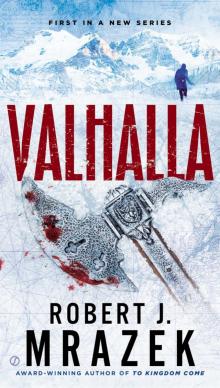 Valhalla
Valhalla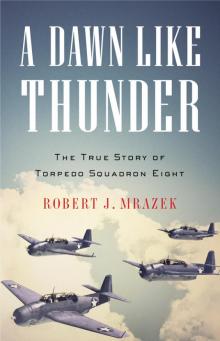 A Dawn Like Thunder
A Dawn Like Thunder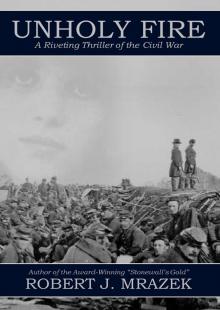 Unholy Fire
Unholy Fire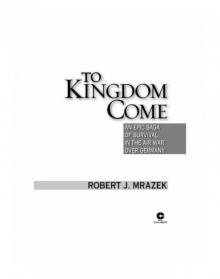 To Kingdom Come
To Kingdom Come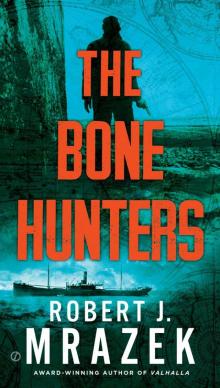 The Bone Hunters
The Bone Hunters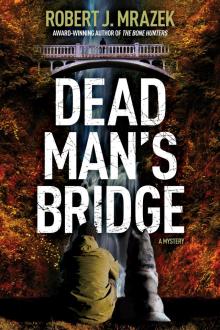 Dead Man's Bridge
Dead Man's Bridge